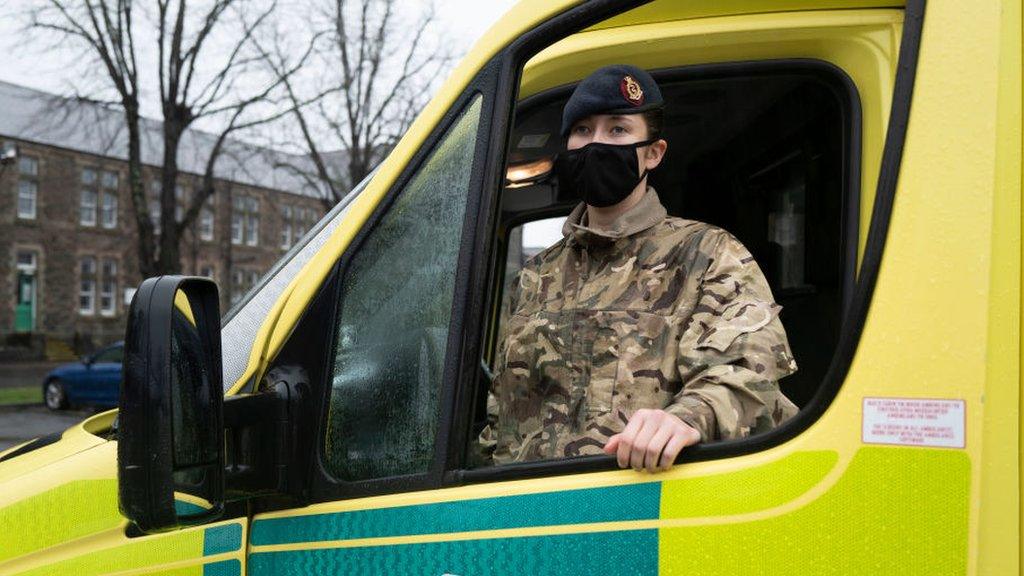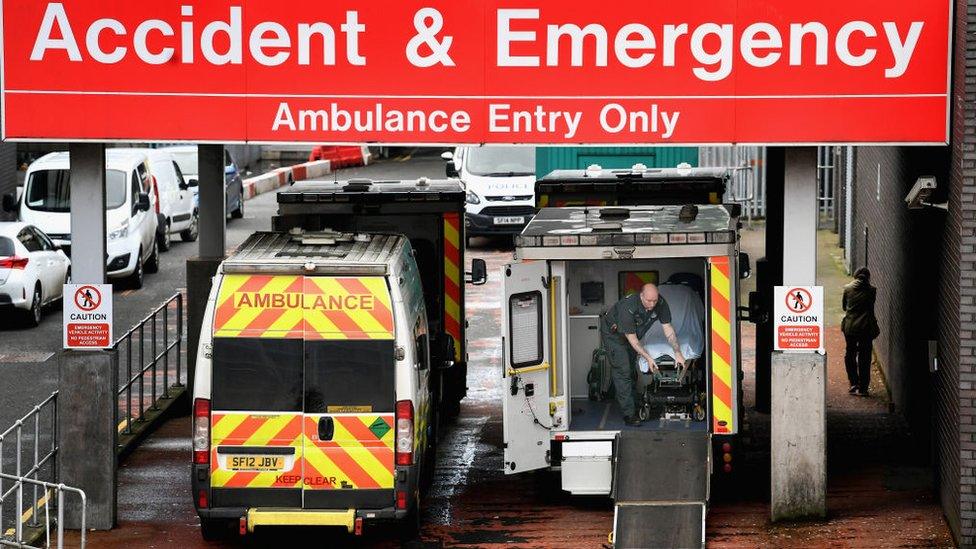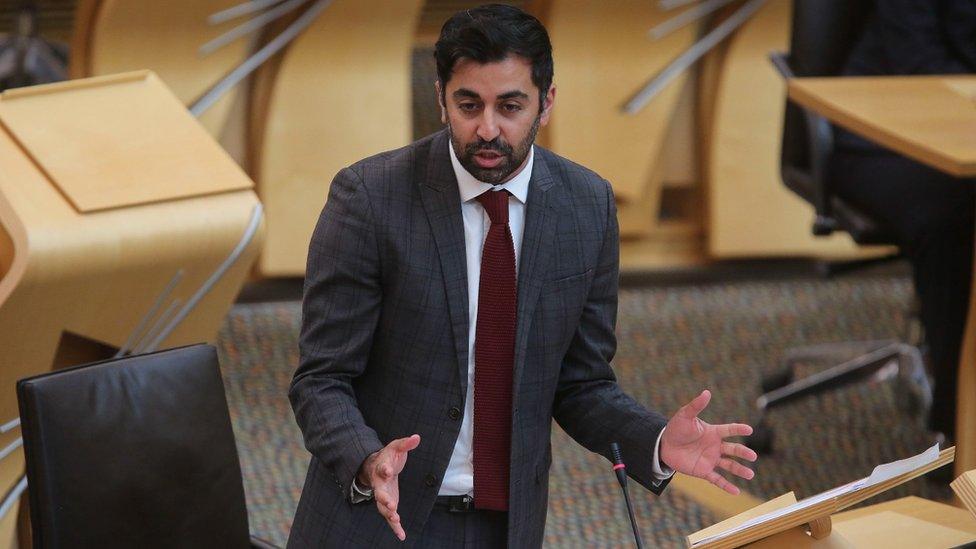Covid in Scotland: Soldiers to drive ambulances from this weekend
- Published

Just over 100 military personnel will be brought in to help the ambulance service
Soldiers will be driving Scottish ambulances from this weekend as part of efforts to ease pressure on the service.
The Ministry of Defence said it was providing 114 personnel, including drivers and support staff, to carry out non-emergency driving work.
An additional 111 personnel will help to run mobile Covid testing units.
Further drivers will also be provided by the fire service, the British Red Cross and taxi firms.
The military support was announced following a request from the Scottish government.
It comes amid warnings from health professionals and opposition politicians of a crisis within the Scottish Ambulance Service in recent weeks, with reports of some patients facing extremely long waits for help to arrive.
They include a pensioner who died in Glasgow after having to wait 40 hours for an ambulance, and an 86-year-old woman who had to lie on her kitchen for eight hours after falling and breaking her hip.
Health Secretary Humza Yousaf told the Scottish Parliament that cases such as these were unacceptable, and apologised to families who had been let down.
But he said the ambulance service and wider NHS were facing unprecedented demand, largely because of Covid but also due to a range other factors including "exceptionally busy emergency departments".
Ambulance crews in Scotland responded to 10,733 life-threatening incidents last month compared to just 5,788 in August 2018.
With winter approaching and the NHS preparing for its most challenging time of the year, Mr Yousaf confirmed an additional £20m for the ambulance service to "help improve response times, alleviate pressures and improve staff wellbeing".
However, he said the short-term pressures on the service would only be relieved "through the wider public and voluntary sector standing up and supporting the service at this incredibly challenging time".
Scottish government officials had been working since last Thursday to finalise a package of support from the military.

Waiting times in Scotland's A&E units are at a record high
Mr Yousaf told parliament on Tuesday afternoon that the government had asked for 88 drivers and 15 support staff - a total of 103 military personnel.
However, a short time later the MoD confirmed that it would provide provide 114 drivers and support staff, as well as the 111 personnel who will help run mobile testing units.
It said they would be deployed from 25 September and were expected to perform their role for a couple of months - primarily in the central belt.
Scottish Secretary Alister Jack said: "Our fantastic British Armed Forces have played a key role in the fight against Covid-19 across the UK and it is admirable to see them once supporting crucial public services in Scotland in times of need.
"The dedication and professionalism of the 225 personnel being deployed will be invaluable for the Scottish Ambulance Service and Covid Mobile Testing Units. We are grateful for all their efforts to keep us safe."

Health Secretary Humza Yousaf announced a series of measures in the Scottish Parliament
Speaking ahead of the MoD announcement, Mr Yousaf said: "My thanks to the army, as always, for their responsiveness.
"We have also reached out to the Scottish Fire and Rescue Service, and I'm glad to say in typical fashion they have risen to a call.
"We have also brought support in from the British Red Cross as well as private contractors such as taxi companies to help with some of the ambulance service's work where no emergency ambulance is required."
He stressed that anyone in critical or life-threatening need would be taken to hospital in an ambulance if one is requested.
The health secretary also announced a range of other measures including:
Immediate work to create temporary admission wards in hospitals, meaning patients can be admitted quicker
About 100 second year paramedic students will help in ambulance control rooms
More hospital ambulance liaison officers at the busiest A&Es to help ensure timely admission and reduce ambulance waiting times.
Mr Yousaf had earlier been told off by the parliament's presiding officer after he revealed details of his plan to the Daily Record newspaper, external before formally announcing it in the Holyrood chamber.
Opposition leaders were critical of the government's approach, saying action to ease pressure on the ambulance service should have been taken much sooner.
Scottish Conservative health spokesman Sandesh Gulhane accused the government of using the pandemic as an excuse for long-standing issues.
And Labour's Jackie Baillie said accident and emergency waiting times were at an all-time high despite the best efforts of NHS staff.
She highlighted comments by John Thomson of the Royal College of Emergency Medicine, who has told BBC Scotland that the NHS needs an additional 1,000 hospital beds to cope with the current crisis.


Over 550 people waited more than 12 hours in an emergency department in the second week of September, a record high. Until this summer, the previous weekly high was in the depths of winter 2018, when the peak number waiting more than 12 hours was 463.
Much of the pressure comes from a scarcity of beds in other parts of the hospital, to allow people to continue their treatment away from A&E. If there is no room elsewhere, people have to sit on trollies, in cubicles, or in ambulances which cannot then be dispatched elsewhere.
There are numerous reasons why the NHS is under siege and Covid is only part of the picture. There are challenges in the community getting people out of hospital, and sometimes wards are closed to new admissions because of staff sickness or isolation.
Staff report dealing with patients presenting with more advanced illnesses, who need to stay in hospital longer.
Many of the problems the NHS is facing existed before the pandemic. Demand is ever-growing and being met with long-term staff vacancies and a reduction in hospital beds.
Help from the army and additional funds will be welcomed, but they won't solve the problem overnight.

According to the latest figures from Public Health Scotland, there were 27,354 attendances at A&E services in Scotland in the week ending 12 September.
Of these, 71.5% were seen and either admitted, discharged or transferred elsewhere within four hours - the lowest total for a number of years, and well below the target level of 95%.
A total of 1,895 patients spent more than eight hours in an A&E department, while 551 of them were there for more than 12 hours.
Mr Yousaf said the government was having "urgent" discussions with local authorities and care providers about how to free up bed capacity, saying he would not dismiss the idea of field hospitals entirely.
He added: "I have spoken to every health board and mentioned that the equipment we had for the Louisa Jordan is available for them to use.
"But it's not just a case of simply setting up beds, we have to have staff as well - we would have to pull the workforce out of extremely busy hospitals."

